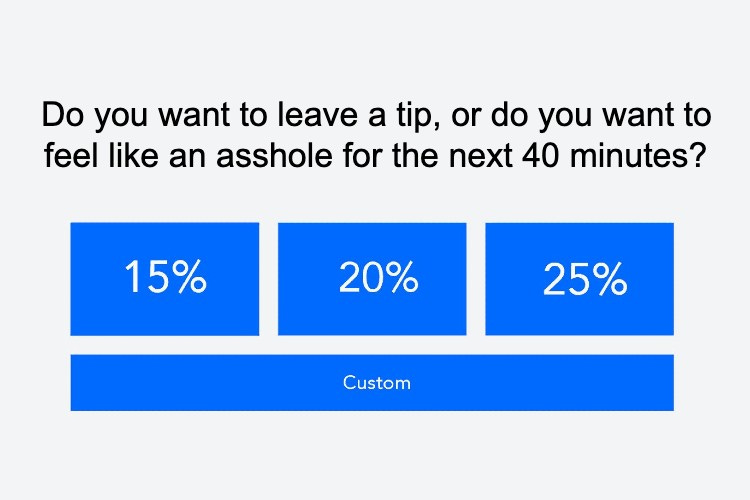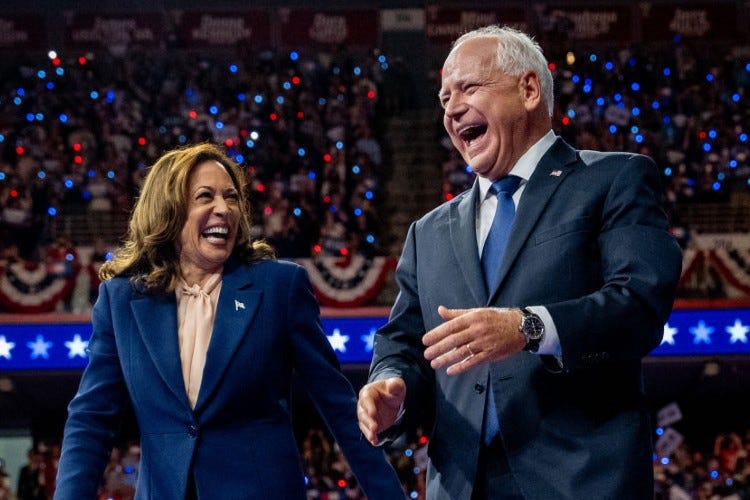The rules of tipping used to be clear. You tipped a waitress for being fast and friendly. You tipped a cabbie for obeying basic hygiene rules. You tipped a prostitute for “driving your ox cart to Calgary” and not commenting on the uncontrollable sobbing.
But recently, the rules have changed. We’re now asked to tip for everything from bagels to burritos. I once encountered a tip request screen at a parking lot where the only “service” they provide is taking your money. I didn’t tip, though I maybe should have thrown them a few bucks for such an impressive display of balls.
What are the rules these days? No one seems to know. This is bad for consumers because we’d like to buy a sandwich without either: A) Feeling like we just paid a $3 Guilt Tax, or B) Feeling like we’re such an unforgivable cheapskate that Charles Dickens might return from the dead just to write about us. The system is also bad for employees who provide adequate service, because they can’t accurately estimate their income, and therefore can’t decide whether to keep working at Domino’s or go back to Moldova to be a heart surgeon.
We need rules, so here are mine. I’m not saying that these should be the rules for everyone; I’m saying “this is what I’m doing until societal pressure forces me to change.” And FWIW, I’m not going to bullshit to make myself seem generous; it’s tempting to write this article as if I’m The Most Generous Man On Earth and then tip exclusively with Canadian pocket change — you’d never catch me. But that would make this exercise pointless. I’m describing my rules with the hope of starting a conversation that will impose order on the chaos.
Servers, barbers, delivery guys, and cabbies/Uber drivers get 20 percent for average service, and more or less based on the quality of service.
A plurality of Americans think that the proper tip for normal service is 15 percent, and obviously they’re not wrong. The only people who are wrong are the ones who think that the right number is 18 percent — I’m not a fucking mathematician, you freaks. Do you really think I can calculate 18 percent on a bill that includes four bourbon-and-7s? No chance. I’ll probably either leave 40 cents or four thousand dollars — round numbers only, please.
I’m also stubbornly clinging to the idea that my tip is a tip, i.e. an extra, optional fee. And, granted: All someone needs to do to access that fee is to provide normal service, which at a restaurant means refill my Diet Coke once and refrain from physical violence and racial slurs. But it is possible to get more or less. I once had an Uber driver spend a 50 minute ride aggressively pitching me their pilot script, so I bumped him down to 15 percent. Plus, I stole the idea and sold it, and it’s now Animal Control, airing Wednesdays at 9 on Fox.
Unfortunately, the before-the-fact tip that happens when you order food online makes altering the tip based on service impossible. But I do have ideas about how to encourage good service and punish bad service regardless of context, which brings me to my second point…
I am the Karen to end all Karens, but I will use my powers for both evil and good.
I don’t agree with the ethic that says you’re a “Karen” if you ever complain about service. Obviously, people should be reasonable; you can’t expect five-star service from someone who doesn’t make enough in an hour to buy the burrito they’re preparing. But I think it’s reasonable to expect someone to do their job. Why should someone be paid — much less tipped — for a job they’re not doing? And why should the person who would replace them have to find a different job so that the first person can continue being a piece of human cholesterol blocking the arteries of commerce? I say fuck that — let me speak to your manager.
But it cuts both ways: If you’re doing a good job, I will contact your manager and sing your praises. I’ll go to the company’s web site, I’ll follow the instructions on my Home Depot receipt to leave a review, I’ll write you up on Yelp and make you sound like the Nelson Mandela of Foot Locker. I always hang around for the survey that comes after customer service calls these days — IMHO, friendly and competent customer service people should be well-paid, because I’m happy to pay a premium to not spend all day talking to some Verizon idiot. My hope is that aggressively up-voting people who are good at their job will lead to promotions and higher salaries for those people, which leads to better organizational efficiency and a better consumer experience. And the people who suck at their job can either repent or reap the wrath of the Alpha Karen.
I tip hotel maids $5 per day because that’s the worst job on Earth.
I get nauseous just thinking about what a hotel maid must encounter in a typical day. Their spouses probably never ask “how was work?”, because the response would be: “There was more semen on the phones today than usual. I found a goat carcass in a bathtub, and a dresser drawer full of butt plugs, and someone wrote ‘EMBRACE THE CATACLYSM’ on a mirror in blood. So, a pretty normal day.” As Christ absorbed the sins of the world, hotel maids absorb the sins committed in hotel rooms, which make up 98 percent of the sins committed in the world. That deserves a tip on the higher end of the scale.
I tip $1.00 for fast food purchases because that seems to improve service.
Many people are annoyed by the fact that buying a burger now usually involves getting asked for a tip even though the first hundred years of burger slinging involved no tips whatsoever. And I can confirm that tipping is new: I worked at Wendy’s, and if someone had tipped, it would only have been because the cashier managed to slip them some drugs or a sexual favor. Tipping was for restaurants with table service; fast food was for keeping costs as low as possible.
I feel like I get better service at places that have the “add a tip” screen. So, sure: I now tack a dollar onto my bill as long as the service is semi-competent. I figure that this is the same as putting a dollar in the jar at a coffee shop, which has long been a thing.
But there’s an exception: I tip nothing if the cashier has set the options on the screen to 20, 25, and 30 percent. That’s just greedy — I refuse to reward hubris. “The Coldstone Creamery Employee Who Got Greedy With The iPad Tip Screen” sounds like a modern Aesop’s Fable, and the arrogant subject of the story needs to be taught a lesson.
Clearly, many of us are tipping because fast food is a hard job and the employees don’t make very much. But let me just say: A far better way to help the working poor would be to increase the Earned Income Tax Credit, and a second-best option would be to increase the minimum wage. If there was a “double the EITC and leave me the fuck alone when I’m buying a taco” ballot initiative, I’d vote for that in a heartbeat.
No tips for service forced on me against my will.
I’m a grown man; I can lift my suitcase into the trunk of a cab. I can also fight off a cabbie who tries to wrestle my bags away from me so that he get a $2 a bag tip. I can also karate kick a bellhop, sucker punch a violinist at a restaurant, and piledrive an overly aggressive squeegee guy. If I want a service, I will request that service, but you can’t force a service upon me without my consent — no tips for service-rape.
Those are my policies. What are yours? It seems like there should be a conversation about this, because if norms have changed, fair enough, but no-one sent me an e-mail. The civilized thing to do is to be straightforward about expectations so that we can all choose whether or not to be an asshole.








As a European, I'm mystified by these American rules where the price on display and the amount you pay are only mildly correlated. You get a $20 meal, but then you have to add taxes that depend on where in the US you are (possibly on the product as well?), and if you add a further 10% on top of that taxed-up price, your American friend goes back to the counter to add an other 10% with an apologetic smile. Here, I know how much I have to pay by simply adding the price tags together, and if you want to tip, you leave a couple euros on the table, or perhaps wave the change away if you paid cash.
Americans were sensible enough to draw their streets in straight lines intersecting at square angles, why is it that a system where the price tag is exactly the amount to be charged could not take root in American culture?
You seem to be forgetting the worst tip scammers of them all - bathroom attendants. Luckily, they seem to be a dying breed, but there's nothing worse than having someone expect to get paid for turning on the tap and handing me a paper towel completely unasked for